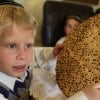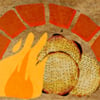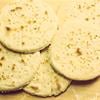It is well documented in the no-longer-secret archives of the KGB that the Soviets were against all religion. But they were particularly intolerant of Torah-observant Jews. During World War II, Soviet Russia waged its great battles not only against the Nazis from without, but also against the Jews within.
In those dismal years, observing Shabbat, blowing the shofar on Rosh Hashanah, learning Torah, baking matzah and celebrating Passover put those who did so in imminent danger of being marked counter-revolutionaries guilty of treason and sent to forced labor camps.
Yet there were diehard souls devoted to Yiddishkeit—my Uncle Chatche and Aunt Pesia among them—who continued to live a Torah life within Communist Russia despite the danger.
In their little house, in a suburb of Moscow, my uncle and aunt baked matzah.
My memory holds a picture of Aunt Pesia, a flowery kerchief covering her hair, standing in front of the table, while Uncle Chatche—face framed by his grey-streaked beard and a black yarmulke on his head—stood in front of the heated brick oven. She rolled the dough, he caught it on a spade and put it on the coil. And, lo and behold, out of the oven came a crisp, delicious matzah. To me, that was a miracle of Heaven!
When Passover arrived, my father, aunt, uncle, and all us children had a secret Seder with matzah, wine, and the Four Questions.
But as the Nazis advanced toward Moscow, the danger from German airplanes flying closer and closer to our home city increased, and so, along with other families with young children, we were evacuated to Siberia. And to Siberia, Father brought a matzah, which he hid in a tightly laced pillowcase.
The day before Passover, Father, a widower, had to go to work, and we three children waited out the long day in our Siberian home—a shack devoid of heat, running water, and food.
The tightly tied pillowcase, with the crispy crumbly matzah inside it, sat on the table, beckoning temptingly.
At some point in the afternoon, finally succumbing to hunger and temptation, three small figures slowly approached the table.
We knew we couldn’t eat the matzah, but surely touching it would be OK. At first, we just touched the pillowcase lightly, feeling its ridges and holes. But then, like a little demolition crew, working with our fingers and hands through the fabric of the pillowcase, we broke the matzah into pieces, then smaller pieces, and then smaller and smaller yet, and finally almost into crumbs.
“No harm done,” we said to ourselves, to justify our deed. “The matzah is still there; we didn’t eat it.”
I don’t remember the exact feel of the matzah crumbling in my hands, but I can tell you this: That matzah, separated from us with just a thin sheet of fabric, inspired our imagination. We talked about what it would be like to actually bite into this crunchy, tasty food and not be hungry anymore. Then we began to dream of the end of the war, when the world would become good again, and how it would feel if our very room would be filled with white bread from floor to ceiling, or if we had a houseful of bread, or better yet a big building entirely filled with bread. We would start at the door, eat our way through the whole building, and finally be sated.
Later, when Father came home, he brought potatoes in his sack. Was he angry about the crumbled matzah? I ask myself today, but I don’t remember. He cooked the potatoes in the small pot we had, and then he made a Seder, giving each of us a taste of the matzah crumbs.
And oh, what a Seder that was! With a song and a smile. In my memory, everyone in my family was happy that night. The potatoes from Father’s sack helped, but it was the crumbled matzah out of the pillowcase that really stood us by. It quenched our hunger not only for food, but for a holiday, and for gladness.
At the end of the Seder, Father sang Chad Gadya softly with a smile. And for that small pocket of time, we felt safe and satisfied.








Start a Discussion